Skip to main content
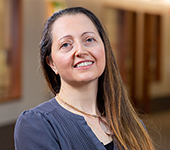 Shortly after Anat Caspi arrived at the University of Washington to lead the Taskar Center for Accessible Technology, she advised a group of students to first place in Seattle’s Hack the Commute competition with a trip planning tool dubbed AccessMap. In the years that followed, she continued to build capacity, both on campus and in the community, for advancing technology designed “for the fullness of human experience” — leading the development of data collection and mapping tools to support urban mobility, project-based courses and summer camps that empower students to apply artificial intelligence and data science to create more inclusive communities, a workshop and toolkit addressing ableism in AI, and more. The Seattle Human Rights Commission recently honored Caspi with its Human Rights Educator Award. Read more →
Shortly after Anat Caspi arrived at the University of Washington to lead the Taskar Center for Accessible Technology, she advised a group of students to first place in Seattle’s Hack the Commute competition with a trip planning tool dubbed AccessMap. In the years that followed, she continued to build capacity, both on campus and in the community, for advancing technology designed “for the fullness of human experience” — leading the development of data collection and mapping tools to support urban mobility, project-based courses and summer camps that empower students to apply artificial intelligence and data science to create more inclusive communities, a workshop and toolkit addressing ableism in AI, and more. The Seattle Human Rights Commission recently honored Caspi with its Human Rights Educator Award. Read more →
January 25, 2024
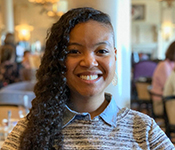 Allen School professor and alum Leilani Battle (B.S., ‘11) originally wanted to be a game developer. As a kid growing up in Bremerton Washington, Battle saw a glimpse of her future every time she booted up her family’s Nintendo 64. Whether dodging shells and banana peels in Mario Kart or catching them all as a Pokemon trainer, she saw how imagination could manifest itself in new and inventive ways. At the University of Washington, Battle’s interests shifted; instead of immersing herself in games, she immersed herself in data — specifically, new and improved ways to explore the vast quantities available to scientists and analysts. She recently received the 2023 VGTC Visualization Significant New Researcher Award from the IEEE Visualization and Graphics Technical Community for her contributions. Read more →
Allen School professor and alum Leilani Battle (B.S., ‘11) originally wanted to be a game developer. As a kid growing up in Bremerton Washington, Battle saw a glimpse of her future every time she booted up her family’s Nintendo 64. Whether dodging shells and banana peels in Mario Kart or catching them all as a Pokemon trainer, she saw how imagination could manifest itself in new and inventive ways. At the University of Washington, Battle’s interests shifted; instead of immersing herself in games, she immersed herself in data — specifically, new and improved ways to explore the vast quantities available to scientists and analysts. She recently received the 2023 VGTC Visualization Significant New Researcher Award from the IEEE Visualization and Graphics Technical Community for her contributions. Read more →
December 11, 2023
 Misinformation can spread like wildfire on social media, fueled in part by platforms’ tendency to prioritize engagement over accuracy. This puts the onus on individual users to determine the veracity of posts they see and share on their feed. Likewise, when it comes to violence, profanity and other potentially harmful content, users are often left to fend for themselves in the face of indifferent or inadequate moderation. The current state can make social media platforms a harrowing place — particularly for members of marginalized communities. Researchers in the University of Washington’s Social Futures Lab led by Allen School professor Amy X. Zhang hope to change that by designing social media tools that empower users while minimizing the burden of managing their online experiences. Read more →
Misinformation can spread like wildfire on social media, fueled in part by platforms’ tendency to prioritize engagement over accuracy. This puts the onus on individual users to determine the veracity of posts they see and share on their feed. Likewise, when it comes to violence, profanity and other potentially harmful content, users are often left to fend for themselves in the face of indifferent or inadequate moderation. The current state can make social media platforms a harrowing place — particularly for members of marginalized communities. Researchers in the University of Washington’s Social Futures Lab led by Allen School professor Amy X. Zhang hope to change that by designing social media tools that empower users while minimizing the burden of managing their online experiences. Read more →
November 30, 2023
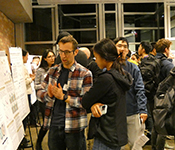 New approaches to finetuning large language models that decrease computational burden while enhancing performance. A robotic arm that safely delivers a forkful of food to someone's mouth. A system that combines wireless earbuds and algorithms into a low-cost hearing screening tool. These are just a sample of the nearly 60 projects that were on display during the Allen School’s Research Showcase and Open House last week. The display capped off a day-long celebration of computing innovations that are advancing the field and benefiting society. Nearly 300 Industry Affiliate partners, alumni and friends participated in the event, which included sessions devoted to computer science ethics, intelligent transportation, computing for sustainability, computing for health, natural language processing and more. Read more →
New approaches to finetuning large language models that decrease computational burden while enhancing performance. A robotic arm that safely delivers a forkful of food to someone's mouth. A system that combines wireless earbuds and algorithms into a low-cost hearing screening tool. These are just a sample of the nearly 60 projects that were on display during the Allen School’s Research Showcase and Open House last week. The display capped off a day-long celebration of computing innovations that are advancing the field and benefiting society. Nearly 300 Industry Affiliate partners, alumni and friends participated in the event, which included sessions devoted to computer science ethics, intelligent transportation, computing for sustainability, computing for health, natural language processing and more. Read more →
November 21, 2023
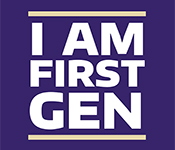 It can feel lonely being the first in your family to pursue a four-year degree. How do you apply? How will you pay for it? What major should you choose? How will you navigate your new surroundings, not to mention make new friends? If you run into difficulty, where do you turn for help? And what are “office hours,” anyway? To mark the National First-Generation College Celebration, which is held annually on November 8th, we asked a diverse group of Allen School students to share what it means to them to “be the first.” Read more →
It can feel lonely being the first in your family to pursue a four-year degree. How do you apply? How will you pay for it? What major should you choose? How will you navigate your new surroundings, not to mention make new friends? If you run into difficulty, where do you turn for help? And what are “office hours,” anyway? To mark the National First-Generation College Celebration, which is held annually on November 8th, we asked a diverse group of Allen School students to share what it means to them to “be the first.” Read more →
November 8, 2023
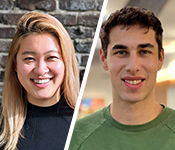 Each year, Google recognizes approximately 75 exceptional graduate students from around the world through its Google Ph.D. Fellowship Program. The students, who come from a variety of backgrounds, are selected based on their potential to influence the future of technology through their research in computer science and related fields. As part of its 2023 class of Fellows, the company selected two future leaders from the Allen School: Miranda Wei in the Security and Privacy category and Mitchell Wortsman… Read more →
Each year, Google recognizes approximately 75 exceptional graduate students from around the world through its Google Ph.D. Fellowship Program. The students, who come from a variety of backgrounds, are selected based on their potential to influence the future of technology through their research in computer science and related fields. As part of its 2023 class of Fellows, the company selected two future leaders from the Allen School: Miranda Wei in the Security and Privacy category and Mitchell Wortsman… Read more →
October 23, 2023
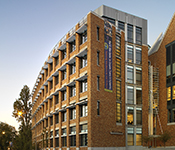 In the late 1990’s, members of the Allen School faculty experimented with a new way to mark the conclusion of Visit Days, the annual pilgrimage made by prospective graduate students to computer science programs around the country. To commemorate the visitors’ time in Seattle, professors would send them on their way with a surprise parting gift: a palm-sized chunk of concrete. The concrete had become dislodged from the crumbling facade of Sieg Hall — home to what was then the Department of Computer Science & Engineering. In 1999, the department stepped up its campaign for a new, permanent home; on October 9, 2003, it celebrated the dedication of the Paul G. Allen Center for Computer Science & Engineering, which set off a chain of events that made the Allen School into the powerhouse it is today. Read more →
In the late 1990’s, members of the Allen School faculty experimented with a new way to mark the conclusion of Visit Days, the annual pilgrimage made by prospective graduate students to computer science programs around the country. To commemorate the visitors’ time in Seattle, professors would send them on their way with a surprise parting gift: a palm-sized chunk of concrete. The concrete had become dislodged from the crumbling facade of Sieg Hall — home to what was then the Department of Computer Science & Engineering. In 1999, the department stepped up its campaign for a new, permanent home; on October 9, 2003, it celebrated the dedication of the Paul G. Allen Center for Computer Science & Engineering, which set off a chain of events that made the Allen School into the powerhouse it is today. Read more →
October 9, 2023
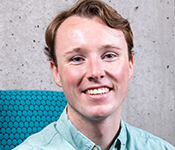 After a two-year hiatus, the University of Washington's Bonderman Travel Fellows are back, independently traveling the world and benefitting from the monumental growth that comes with immersing oneself in unfamiliar spaces. Since its inception in 1995, the fellowship has supported over 300 UW students on their travels based on their curiosity, openness, resilience and creativity. Soon, it will be Allen School Ph.D. student Gus Smith’s turn to hit the road, along with seven other graduate students who were named 2023 Bonderman Fellows. Read more →
After a two-year hiatus, the University of Washington's Bonderman Travel Fellows are back, independently traveling the world and benefitting from the monumental growth that comes with immersing oneself in unfamiliar spaces. Since its inception in 1995, the fellowship has supported over 300 UW students on their travels based on their curiosity, openness, resilience and creativity. Soon, it will be Allen School Ph.D. student Gus Smith’s turn to hit the road, along with seven other graduate students who were named 2023 Bonderman Fellows. Read more →
September 26, 2023
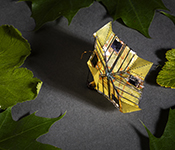 On a cool afternoon at the heart of the University of Washington’s campus, autumn, for a few fleeting moments, appears to have arrived early. Tiny golden squares resembling leaves flutter then fall, switching from a frenzied tumble to a graceful descent with a snap. Aptly named “microfliers” and inspired by Miura-fold origami, these small robotic devices can fold closed during their descent after being dropped from a drone. This “snapping” action changes the way they disperse and may, in the future, help change the way scientists study agriculture, meteorology, climate change and more. Read more →
On a cool afternoon at the heart of the University of Washington’s campus, autumn, for a few fleeting moments, appears to have arrived early. Tiny golden squares resembling leaves flutter then fall, switching from a frenzied tumble to a graceful descent with a snap. Aptly named “microfliers” and inspired by Miura-fold origami, these small robotic devices can fold closed during their descent after being dropped from a drone. This “snapping” action changes the way they disperse and may, in the future, help change the way scientists study agriculture, meteorology, climate change and more. Read more →
September 13, 2023
 Technology can have unforeseen, and ostensibly unintended, negative consequences in the real world. Allen School Ph.D. student Rock Yuren Pang and professors Katharina Reinecke, Dan Grossman and Tadayoshi Kohno are advancing a vision for PEACE — short for “Proactively Exploring and Addressing Consequences and Ethics” — that will empower researchers to anticipate those consequences “early, often, and across computer science.” The team’s work is supported by a five-year institutional transformation grant through the National Science Foundation’s Ethical and Responsible Research (ER2) program. Read more →
Technology can have unforeseen, and ostensibly unintended, negative consequences in the real world. Allen School Ph.D. student Rock Yuren Pang and professors Katharina Reinecke, Dan Grossman and Tadayoshi Kohno are advancing a vision for PEACE — short for “Proactively Exploring and Addressing Consequences and Ethics” — that will empower researchers to anticipate those consequences “early, often, and across computer science.” The team’s work is supported by a five-year institutional transformation grant through the National Science Foundation’s Ethical and Responsible Research (ER2) program. Read more →
September 12, 2023
« Newer Posts — Older Posts »
 Shortly after Anat Caspi arrived at the University of Washington to lead the Taskar Center for Accessible Technology, she advised a group of students to first place in Seattle’s Hack the Commute competition with a trip planning tool dubbed AccessMap. In the years that followed, she continued to build capacity, both on campus and in the community, for advancing technology designed “for the fullness of human experience” — leading the development of data collection and mapping tools to support urban mobility, project-based courses and summer camps that empower students to apply artificial intelligence and data science to create more inclusive communities, a workshop and toolkit addressing ableism in AI, and more. The Seattle Human Rights Commission recently honored Caspi with its Human Rights Educator Award. Read more →
Shortly after Anat Caspi arrived at the University of Washington to lead the Taskar Center for Accessible Technology, she advised a group of students to first place in Seattle’s Hack the Commute competition with a trip planning tool dubbed AccessMap. In the years that followed, she continued to build capacity, both on campus and in the community, for advancing technology designed “for the fullness of human experience” — leading the development of data collection and mapping tools to support urban mobility, project-based courses and summer camps that empower students to apply artificial intelligence and data science to create more inclusive communities, a workshop and toolkit addressing ableism in AI, and more. The Seattle Human Rights Commission recently honored Caspi with its Human Rights Educator Award. Read more →

 Shortly after Anat Caspi arrived at the University of Washington to lead the Taskar Center for Accessible Technology, she advised a group of students to first place in Seattle’s Hack the Commute competition with a trip planning tool dubbed AccessMap. In the years that followed, she continued to build capacity, both on campus and in the community, for advancing technology designed “for the fullness of human experience” — leading the development of data collection and mapping tools to support urban mobility, project-based courses and summer camps that empower students to apply artificial intelligence and data science to create more inclusive communities, a workshop and toolkit addressing ableism in AI, and more. The Seattle Human Rights Commission recently honored Caspi with its Human Rights Educator Award. Read more →
Shortly after Anat Caspi arrived at the University of Washington to lead the Taskar Center for Accessible Technology, she advised a group of students to first place in Seattle’s Hack the Commute competition with a trip planning tool dubbed AccessMap. In the years that followed, she continued to build capacity, both on campus and in the community, for advancing technology designed “for the fullness of human experience” — leading the development of data collection and mapping tools to support urban mobility, project-based courses and summer camps that empower students to apply artificial intelligence and data science to create more inclusive communities, a workshop and toolkit addressing ableism in AI, and more. The Seattle Human Rights Commission recently honored Caspi with its Human Rights Educator Award. Read more →
 Allen School professor and alum Leilani Battle (B.S., ‘11) originally wanted to be a game developer. As a kid growing up in Bremerton Washington, Battle saw a glimpse of her future every time she booted up her family’s Nintendo 64. Whether dodging shells and banana peels in Mario Kart or catching them all as a Pokemon trainer, she saw how imagination could manifest itself in new and inventive ways. At the University of Washington, Battle’s interests shifted; instead of immersing herself in games, she immersed herself in data — specifically, new and improved ways to explore the vast quantities available to scientists and analysts. She recently received the 2023 VGTC Visualization Significant New Researcher Award from the IEEE Visualization and Graphics Technical Community for her contributions. Read more →
Allen School professor and alum Leilani Battle (B.S., ‘11) originally wanted to be a game developer. As a kid growing up in Bremerton Washington, Battle saw a glimpse of her future every time she booted up her family’s Nintendo 64. Whether dodging shells and banana peels in Mario Kart or catching them all as a Pokemon trainer, she saw how imagination could manifest itself in new and inventive ways. At the University of Washington, Battle’s interests shifted; instead of immersing herself in games, she immersed herself in data — specifically, new and improved ways to explore the vast quantities available to scientists and analysts. She recently received the 2023 VGTC Visualization Significant New Researcher Award from the IEEE Visualization and Graphics Technical Community for her contributions. Read more →
 Misinformation can spread like wildfire on social media, fueled in part by platforms’ tendency to prioritize engagement over accuracy. This puts the onus on individual users to determine the veracity of posts they see and share on their feed. Likewise, when it comes to violence, profanity and other potentially harmful content, users are often left to fend for themselves in the face of indifferent or inadequate moderation. The current state can make social media platforms a harrowing place — particularly for members of marginalized communities. Researchers in the University of Washington’s Social Futures Lab led by Allen School professor Amy X. Zhang hope to change that by designing social media tools that empower users while minimizing the burden of managing their online experiences. Read more →
Misinformation can spread like wildfire on social media, fueled in part by platforms’ tendency to prioritize engagement over accuracy. This puts the onus on individual users to determine the veracity of posts they see and share on their feed. Likewise, when it comes to violence, profanity and other potentially harmful content, users are often left to fend for themselves in the face of indifferent or inadequate moderation. The current state can make social media platforms a harrowing place — particularly for members of marginalized communities. Researchers in the University of Washington’s Social Futures Lab led by Allen School professor Amy X. Zhang hope to change that by designing social media tools that empower users while minimizing the burden of managing their online experiences. Read more →
 New approaches to finetuning large language models that decrease computational burden while enhancing performance. A robotic arm that safely delivers a forkful of food to someone's mouth. A system that combines wireless earbuds and algorithms into a low-cost hearing screening tool. These are just a sample of the nearly 60 projects that were on display during the Allen School’s Research Showcase and Open House last week. The display capped off a day-long celebration of computing innovations that are advancing the field and benefiting society. Nearly 300 Industry Affiliate partners, alumni and friends participated in the event, which included sessions devoted to computer science ethics, intelligent transportation, computing for sustainability, computing for health, natural language processing and more. Read more →
New approaches to finetuning large language models that decrease computational burden while enhancing performance. A robotic arm that safely delivers a forkful of food to someone's mouth. A system that combines wireless earbuds and algorithms into a low-cost hearing screening tool. These are just a sample of the nearly 60 projects that were on display during the Allen School’s Research Showcase and Open House last week. The display capped off a day-long celebration of computing innovations that are advancing the field and benefiting society. Nearly 300 Industry Affiliate partners, alumni and friends participated in the event, which included sessions devoted to computer science ethics, intelligent transportation, computing for sustainability, computing for health, natural language processing and more. Read more →
 It can feel lonely being the first in your family to pursue a four-year degree. How do you apply? How will you pay for it? What major should you choose? How will you navigate your new surroundings, not to mention make new friends? If you run into difficulty, where do you turn for help? And what are “office hours,” anyway? To mark the National First-Generation College Celebration, which is held annually on November 8th, we asked a diverse group of Allen School students to share what it means to them to “be the first.” Read more →
It can feel lonely being the first in your family to pursue a four-year degree. How do you apply? How will you pay for it? What major should you choose? How will you navigate your new surroundings, not to mention make new friends? If you run into difficulty, where do you turn for help? And what are “office hours,” anyway? To mark the National First-Generation College Celebration, which is held annually on November 8th, we asked a diverse group of Allen School students to share what it means to them to “be the first.” Read more →
 Each year, Google recognizes approximately 75 exceptional graduate students from around the world through its Google Ph.D. Fellowship Program. The students, who come from a variety of backgrounds, are selected based on their potential to influence the future of technology through their research in computer science and related fields. As part of its 2023 class of Fellows, the company selected two future leaders from the Allen School: Miranda Wei in the Security and Privacy category and Mitchell Wortsman… Read more →
Each year, Google recognizes approximately 75 exceptional graduate students from around the world through its Google Ph.D. Fellowship Program. The students, who come from a variety of backgrounds, are selected based on their potential to influence the future of technology through their research in computer science and related fields. As part of its 2023 class of Fellows, the company selected two future leaders from the Allen School: Miranda Wei in the Security and Privacy category and Mitchell Wortsman… Read more →
 In the late 1990’s, members of the Allen School faculty experimented with a new way to mark the conclusion of Visit Days, the annual pilgrimage made by prospective graduate students to computer science programs around the country. To commemorate the visitors’ time in Seattle, professors would send them on their way with a surprise parting gift: a palm-sized chunk of concrete. The concrete had become dislodged from the crumbling facade of Sieg Hall — home to what was then the Department of Computer Science & Engineering. In 1999, the department stepped up its campaign for a new, permanent home; on October 9, 2003, it celebrated the dedication of the Paul G. Allen Center for Computer Science & Engineering, which set off a chain of events that made the Allen School into the powerhouse it is today. Read more →
In the late 1990’s, members of the Allen School faculty experimented with a new way to mark the conclusion of Visit Days, the annual pilgrimage made by prospective graduate students to computer science programs around the country. To commemorate the visitors’ time in Seattle, professors would send them on their way with a surprise parting gift: a palm-sized chunk of concrete. The concrete had become dislodged from the crumbling facade of Sieg Hall — home to what was then the Department of Computer Science & Engineering. In 1999, the department stepped up its campaign for a new, permanent home; on October 9, 2003, it celebrated the dedication of the Paul G. Allen Center for Computer Science & Engineering, which set off a chain of events that made the Allen School into the powerhouse it is today. Read more →
 After a two-year hiatus, the University of Washington's Bonderman Travel Fellows are back, independently traveling the world and benefitting from the monumental growth that comes with immersing oneself in unfamiliar spaces. Since its inception in 1995, the fellowship has supported over 300 UW students on their travels based on their curiosity, openness, resilience and creativity. Soon, it will be Allen School Ph.D. student Gus Smith’s turn to hit the road, along with seven other graduate students who were named 2023 Bonderman Fellows. Read more →
After a two-year hiatus, the University of Washington's Bonderman Travel Fellows are back, independently traveling the world and benefitting from the monumental growth that comes with immersing oneself in unfamiliar spaces. Since its inception in 1995, the fellowship has supported over 300 UW students on their travels based on their curiosity, openness, resilience and creativity. Soon, it will be Allen School Ph.D. student Gus Smith’s turn to hit the road, along with seven other graduate students who were named 2023 Bonderman Fellows. Read more →
 On a cool afternoon at the heart of the University of Washington’s campus, autumn, for a few fleeting moments, appears to have arrived early. Tiny golden squares resembling leaves flutter then fall, switching from a frenzied tumble to a graceful descent with a snap. Aptly named “microfliers” and inspired by Miura-fold origami, these small robotic devices can fold closed during their descent after being dropped from a drone. This “snapping” action changes the way they disperse and may, in the future, help change the way scientists study agriculture, meteorology, climate change and more. Read more →
On a cool afternoon at the heart of the University of Washington’s campus, autumn, for a few fleeting moments, appears to have arrived early. Tiny golden squares resembling leaves flutter then fall, switching from a frenzied tumble to a graceful descent with a snap. Aptly named “microfliers” and inspired by Miura-fold origami, these small robotic devices can fold closed during their descent after being dropped from a drone. This “snapping” action changes the way they disperse and may, in the future, help change the way scientists study agriculture, meteorology, climate change and more. Read more →
 Technology can have unforeseen, and ostensibly unintended, negative consequences in the real world. Allen School Ph.D. student Rock Yuren Pang and professors Katharina Reinecke, Dan Grossman and Tadayoshi Kohno are advancing a vision for PEACE — short for “Proactively Exploring and Addressing Consequences and Ethics” — that will empower researchers to anticipate those consequences “early, often, and across computer science.” The team’s work is supported by a five-year institutional transformation grant through the National Science Foundation’s Ethical and Responsible Research (ER2) program. Read more →
Technology can have unforeseen, and ostensibly unintended, negative consequences in the real world. Allen School Ph.D. student Rock Yuren Pang and professors Katharina Reinecke, Dan Grossman and Tadayoshi Kohno are advancing a vision for PEACE — short for “Proactively Exploring and Addressing Consequences and Ethics” — that will empower researchers to anticipate those consequences “early, often, and across computer science.” The team’s work is supported by a five-year institutional transformation grant through the National Science Foundation’s Ethical and Responsible Research (ER2) program. Read more →
